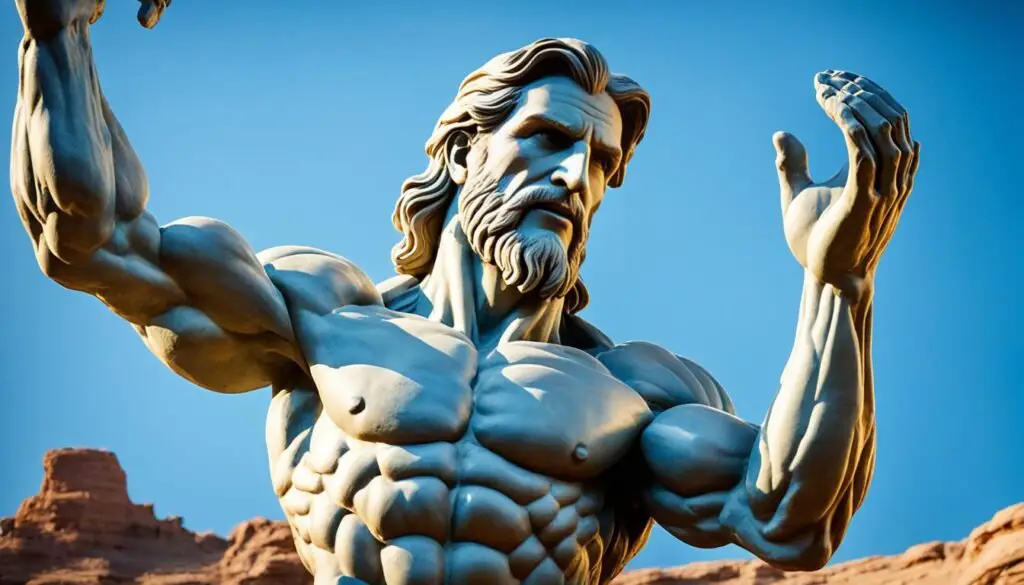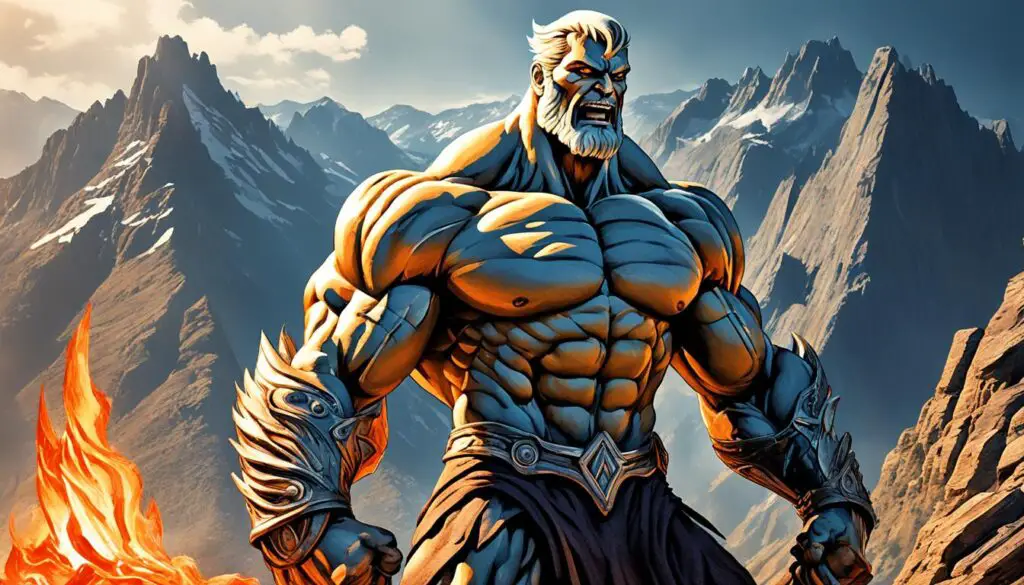The Titan Prometheus, celebrated in Greek myths, is renowned as the bringer of fire to humanity and a symbol of defiance against the Olympian gods.
Known for his intelligence and as a champion of humankind, Prometheus provided essential technology, knowledge, and civilization to mankind.
However, this benevolence led to severe consequences, as Prometheus was punished by Zeus, showcasing him as a true mythological rebel.
This mythological figure holds a significant place in Greek mythology for creating humanity from clay and for his unwavering commitment to human progress.
The Prometheus punishment story, where he was bound to a rock with an eagle preying upon his liver daily, emphasizes both his suffering and his heroism.
Key Takeaways
- Prometheus is a Titan and god of fire in Greek mythology.
- He defied Zeus by giving fire to humanity, symbolizing technology and knowledge.
- Prometheus was punished by being chained to a rock with an eagle eating his regenerating liver daily.
- He played a vital role in Greek myths, often depicted as a benefactor of human civilization.
- His story is recounted in several works, including Hesiod’s “Theogony” and Aeschylus’ “Prometheus Bound.”
Introduction to Prometheus
Prometheus, a Titan god known for his forethought and crafty counsel, holds a significant place in the myth of Prometheus.
His intelligence and defiance against Zeus make him a compelling figure in Greek mythology.
Prometheus attempted to improve the lives of mankind by stealing fire from heaven and delivering it to mortals, often described as the gift of civilization.
This act of rebellion against Prometheus and Zeus resulted in severe punishment.
As retribution, Zeus had him bound on Mount Kaukasos, where an eagle fed on his ever-regenerating liver.
His story is not just about the theft of fire in Greek mythology but also carries substantial cultural significance.
Prometheus was often identified in myth and cult with the fire-god Hephaistos and the giant Tityos, further cementing his importance in ancient lore.
Despite the harsh penalties, Prometheus’ contributions were immensely beneficial to humanity.
He taught mankind various arts and knowledge such as architecture, astronomy, mathematics, and medicine, fundamentally shaping early human civilization.
This cultural significance is why Prometheus remains a renowned figure, embodying the eternal struggle for knowledge and freedom.
The Origins of Prometheus
The origins of Prometheus are deeply rooted in Greek mythological families and the Titan lineage.
Embraced as one of the pivotal figures in myth, Prometheus stands as a symbol of foresight and rebellion against divine authority.
Parentage and Siblings
Prometheus hailed from a noble lineage of Titans. His father was Iapetus, and his mother was the Oceanid Clymene.
Prometheus’ brothers included notable figures such as Atlas, known for holding up the sky; Epimetheus, whose name means “afterthought”; and Menoetius, famed for his defiance and subsequent punishment by Zeus.
These family ties firmly established Prometheus within the revered Titan lineage and showcased the interconnectedness of Greek mythological families.
Meaning of the Name Prometheus
The name Prometheus carries significant meaning in Greek mythology. Derived from the Greek word “Prometheia,” it translates to “forethought.”
This designation underscores Prometheus’ wisdom and his ability to foresee events—a sharp contrast to his brother Epimetheus, whose name means “afterthought.”
The etymological roots of his name emphasize the dichotomy present in Greek mythological families, where foresight and hindsight play crucial roles in the unfolding drama of divine and mortal interactions.
Prometheus’ Role in the Titanomachy
The Titanomachy, often depicted as an epic ten-year war, saw the Titans battle against the rising Olympian gods.
Prometheus, one of the Titans and renowned for his wisdom, made a decisive choice in this Titan war by aligning himself with the Olympians.
Thus, Prometheus’ allegiance to Zeus was a turning point in this colossal struggle.
Prometheus, whose foresight earned him the title of “forethinker,” played a pivotal role with his wise counsel.
Born during the era of the Titans before the Olympian gods like Zeus emerged, his decision to side with Zeus displayed his profound strategic insight.
This significant move not only demonstrated Prometheus’ wisdom but also greatly influenced the eventual downfall of the Titans, as he had foreseen.
Despite his crucial contributions to the Olympians’ victory, Prometheus soon found himself disillusioned with Zeus’s tyrannical rule.
This disenchantment drove him to acts of rebellion, highlighting his enduring dedication to humanity’s welfare, which contrasted sharply with Zeus’s authoritarian approach.
His allegiance to the well-being of mankind rather than the whims of the gods cemented Prometheus as a benefactor of humanity.
Prometheus and Zeus
Prometheus and Zeus shared a complicated relationship characterized by both cooperation and profound conflict.
Their bond, initially forged during the Titanomachy, eventually turned antagonistic due to Prometheus’s progressive ideas and bold actions.
The Trick at Mecone
One of the earliest notable instances of Prometheus trickery occurred at Mecone. During a sacrificial feast, Prometheus cleverly deceived Zeus.
He divided the offerings into two piles: a deceptive, largely inedible pile disguised with appetizing fat, and a genuinely appetizing pile concealed under skin and bones.
Zeus chose the former, securing the more desirable portion of meat for mankind. This act not only enraged Zeus but also positioned Prometheus as Zeus’s adversary in the ensuing struggle.
The Theft of Fire
Following the incident at Mecone, Zeus sought to retaliate by hiding fire from mankind.
This divine privilege was essential for human survival, driving Prometheus to intervene once again.
Exhibiting his characteristic cunning, Prometheus committed the famed theft of fire by stealing it from the gods and cleverly concealing it within a fennel stalk.
This bold act of defiance further intensified the conflict with Olympian gods, solidifying Prometheus’s role as the champion of humanity and a symbol of resistance against divine tyranny.
Who Was Prometheus? Greek Mythology’s Fire Bringer
Prometheus, the Titan god known for his forethought and cunning, played a pivotal role in ancient Greek mythology by bestowing the gift of fire upon humanity.
This act not only marked Prometheus as a hero in the eyes of humans but also emphasized the profound significance of fire in the development of civilization.
As a culture hero, Prometheus’ actions symbolized the advancement of technology and the spread of knowledge among mortals.
The Role of Fire in Ancient Greek Culture
In ancient Greek culture, fire was much more than a mere source of warmth. It represented technological empowerment and was essential for daily life, from cooking to metalworking.
The theft of fire by Prometheus is a cornerstone myth that underscores how fire bridged the gap between primitive existence and the dawn of civilization.
By sneaking this divine element to humans, Prometheus ignited a spark of progress that would fuel countless innovations.
The Fennel Stalk Story
According to legend, Prometheus cleverly stole fire from the heavens and concealed it inside a fennel stalk to safely transport it to earth.
This daring act of the theft of fire is a testament to his resourcefulness and unwavering dedication to humanity.
In many accounts, this story illustrates the use of natural materials in ancient Greek rituals and highlights Prometheus’ inventive nature.
By delivering fire, Prometheus cemented his legacy as a protector and benefactor of mankind, embodying the qualities of a true culture hero.
Punishment of Prometheus

Prometheus, whose name means “Forethought,” faced intense repercussions for aiding humankind and defying Zeus.
Infuriated by Prometheus for his audacious act of stealing fire and gifting it to humans, Zeus ordered severe punishment upon him.
The legend narrates a harrowing tale of Prometheus suffering an eternal torment.
Chained to Mount Caucasus
Zeus, the new ruler of the gods and goddesses, commanded that Prometheus be nailed to a cliff in Scythia, bound with bronze shackles and a strong bronze chain forged by Hephaestus, the divine blacksmith.
This Greek mythological punishment saw Prometheus restrained against the cold, jagged rocks of Mount Caucasus.
The Liver-Eating Eagle
The torment didn’t end with mere bondage. Each day, an eagle—symbolic of Zeus’ wrath—descended upon the chained Titan, relentlessly tearing out his liver.
Despite the agony, Prometheus’s liver would regenerate every night, courtesy of his immortality.
This cycle of brutal consumption and regeneration epitomized the cruelest aspects of Greek mythological punishment.
In this eternal torment, Prometheus bore the relentless cycle of agony, epitomizing the dire consequences of defying the authority of the gods.
Rescue by Heracles
Heracles, whose legendary adventures have solidified him as one of the greatest Greek heroes, undertook a quest involving Prometheus as part of his renowned Twelve Labors.
One of Heracles’ tasks was to retrieve the Golden Apples, which Hera had once given to Zeus as a wedding gift.
This journey brought Heracles face-to-face with numerous challenges, from battling demigods to capturing the elusive sea-god Nereus for guidance.
During his heroic exploits, Heracles discovered Prometheus bound to the Caucasus Mountains, tormented daily by an eagle that pecked at his liver—Zeus’s harsh punishment for giving fire to mankind. Fuelled by his intrinsic valor and compassion, Heracles’ heroism shone as he killed the eagle with his powerful bow, ceasing Prometheus’s agonizing torment.
Initially hesitant, Zeus eventually acquiesced to Heracles’ bold request to free Prometheus.
This pivotal moment marked the Prometheus liberation and showcased the complex but intrinsic bond between the gods and heroes of Greek mythology. Prometheus, in profound gratitude, aided Heracles in his subsequent quests.
One such task led Heracles to Atlas, Prometheus’ brother, who guarded the Golden Apples with the formidable dragon Ladon.
Through this act of bravery, Heracles further cemented his place among the revered Greek heroes.
Moreover, this episode underscored Prometheus’ multifaceted role in myth—once a sufferer, now a liberated ally—and reflected the nuanced relationships within the divine pantheon.
Prometheus in Literature and Art

The cultural depictions of Prometheus across literature and art have spanned millennia, embodying the timeless struggle between human ambition and divine retribution.
As a symbol of intellectual rebellion and ingenuity, Prometheus finds himself at the heart of Western classical tradition.
In the notable play Prometheus Bound by Aeschylus, Prometheus is immortalized as a champion of humanity who defies Zeus.
Various novels, short stories, and scientific works reference Prometheus as a metaphor for scientific progress and ethical dilemmas, especially in the realm of liver regeneration, mirroring his mythic punishment by an eagle.
Additionally, Prometheus’ influence in art is evident through numerous visual mediums.
His struggle has been depicted in paintings, sculptures, and modern animations, such as the 1969 Russian animated short film by Aleksandra Snezhko-Blotskaya.
Prometheus’ legacy extends to music as well. The American Metalcore band Trivium’s song “Of Prometheus and The Crucifix” parallels the Titan’s suffering with the crucifixion of Jesus Christ.
Similarly, Emperor’s 2001 album, Prometheus: The Discipline of Fire & Demise, underscores the Titan’s enduring influence in art.
The Prometheus Society, named after the mythic figure, celebrates high intelligence by publishing a magazine titled Gift of Fire.
Likewise, the Prometheus Award honors libertarian science fiction, further cementing the cultural significance of Prometheus in modern intellectual circles.
Moreover, Prometheus Books, a publishing company, offers a plethora of educational content related to secular humanism and scientific skepticism, paying homage to the Titan’s gift of fire, metaphorically representing enlightenment and knowledge.
The name of the element promethium and the S-500 missile system also draw inspiration from this myth, demonstrating the vast influence of Prometheus across different fields.
These extensive cultural depictions of Prometheus not only underscore his role in the classical tradition but also highlight his lasting influence in art, literature, and beyond.
Prometheus and the Ritual of Sacrifice
Prometheus’s cunning and defiance of the gods established foundational *Greek sacrifice rituals* that defined the relationship between mortals and deities.
Particularly, his trick at Mecone is emblematic of these Prometheus and religious practices, highlighting the cleverness he used to favor humanity.
The Origins of Animal Sacrifice
The myth of Prometheus is deeply intertwined with the origins of animal sacrifice in ancient Greek culture.
According to the legend, Prometheus offered a deceptive division of a sacrificial ox to Zeus.
One portion appeared appealing but contained only bones, while the other, less attractive portion, contained the meat.
Zeus, tricked by Prometheus, chose the bones, leaving the meat for humans. This story signifies how humans would feast on flesh, while the gods received the bones and fat in rituals, a tradition explaining the origins of animal sacrifices and establishing a covenant through sacrifice.
The Mecone Sacrifice
The famous Trick at Mecone further delineates the intricate interplay between gods and mortals within Greek mythology.
As retaliation for Prometheus’s deception, Zeus hid fire from humankind. However, Prometheus defied Zeus by stealing fire back for humanity, an act that was both rebellious and deeply sacrificial.
This act of stealing fire is pivotal in converting Greek society from relying solely on divine benevolence to one where humanity could harness fire for knowledge, enlightenment, and civilization.
This narrative underscores the importance of Prometheus and religious practices, highlighting how his actions shaped and justified rituals such as the division of sacrificial offerings between gods and humans.
For more insights on Prometheus’s contributions to sacrifice rituals, the article on Prometheus and his sacrifices provides an in-depth analysis.
Prometheus and the Creation of Man

The myth of Prometheus, Epimetheus, and Pandora is a captivating tale from ancient Greece that has been retold through ages with fascinating variations.
Prometheus and Epimetheus were entrusted with the divine task of creating man and beasts upon the earth.
Prometheus’s craftsmanship in molding man from clay and shaping them to resemble the gods showcases his significant role in this narrative.
The Role of Athena
Athena’s assistance played a crucial part in the creation of humanity. According to one tradition, Prometheus shaped man out of mud, and Athena imbued these clay figures with life, breathing vitality into their form.
This collaborative effort between Prometheus’s craftsmanship and Athena’s divine breath illustrates the shared nature of divine creation in Greek mythology.
Furthermore, Prometheus’s action of stealing fire from the gods and giving it to mankind not only facilitated human civilization but also underscored his dedication to the welfare of humanity.
The combined efforts of Prometheus and Athena depict a powerful narrative of divine intervention and innovation.
The Physical Creation
Prometheus meticulously shaped man from water and earth, dedicating himself to their formation with great precision.
While his brother Epimetheus swiftly created various creatures, endowing them with gifts like flight, swiftness, and strength, Prometheus focused on perfecting mankind.
However, Epimetheus had already exhausted all the best traits on animals, leaving nothing for man.
In response, Prometheus gave mankind the gift of an upright posture, setting humans apart from other creatures.
This act of giving speaks volumes about Prometheus’s craftsmanship and his foresight in human development.
By integrating the talents of both Prometheus and Athena, the creation of humanity became a pivotal moment in Greek mythology, highlighting the intricate blend of divine skills and intentions.
The Flood Myth: Deucalion and Pyrrha
The Greek flood narrative featuring Deucalion and Pyrrha, children of Prometheus, is a compelling tale highlighted across various Greek and Roman texts.
Their story of enduring the catastrophic flood and contributing to the survival of humanity aligns closely with other significant flood myths, emphasizing their role in the continuity of human life.
Survival during the Flood
When Jupiter, enraged by human wickedness, decides to annihilate mankind, it is Deucalion and Pyrrha who survive.
The couple, forewarned by Deucalion’s father, Prometheus, constructs a small chest to endure the deluge.
For nine days and nights, they float on tumultuous waters until they finally find refuge atop Mount Parnassos near Delphi.
This Greek flood narrative shares a remarkable 90% similarity with the Biblical story of Noah’s Ark, showcasing the cross-cultural themes of endurance and survival during great floods.
Repopulation of Earth
Upon safely landing, Deucalion and Pyrrha seek assistance from the goddess Themis to repopulate the Earth.
Instructed to cast stones over their shoulders, they witness an extraordinary transformation: the stones thrown by Deucalion become men, while those cast by Pyrrha turn into women.
This miraculous event sparks the regeneration of the human race. Their contributions don’t end there; the couple’s son Hellen becomes the progenitor of various Greek tribes, thereby embedding Deucalion and Pyrrha’s legacy into the genealogical fabric of Greece.
This integral role in humanity’s renewal is an enduring testament to their resilience and significance in mythological narratives.
Prometheus in Modern Culture

Prometheus’s legacy continues to illuminate modern culture, serving as a symbol of innovation and defiance.
The tale of Prometheus giving gifts and stealing fire is often used to portray the joys and sorrows of self-awareness.
This enduring myth has made its way into various contemporary references, emphasizing the consequences of seeking forbidden knowledge.
One striking example is Mary Shelley’s Frankenstein, where Victor Frankenstein is often dubbed “The Modern Prometheus.” Shelley’s narrative explores the themes of ambition and the pursuit of God-like powers, leading to inevitable destruction.
A similar Promethean character is Captain Ahab in Herman Melville’s Moby Dick, whose relentless hunt for the white whale mirrors the mythic quest for forbidden enlightenment, resulting in disastrous consequences.
The enduring myth resonates in Fyodor Dostoevsky’s Crime and Punishment as well.
Raskolnikov’s decision to kill the old pawnbroker is a Promethean act of testing his belief, leading to devastating personal consequences.
This theme is evident in the recent film Prometheus, where the crew’s quest for knowledge ends in fatal outcomes, highlighting the double-edged sword of enlightenment.
Moreover, Prometheus’s legacy can be traced back to ancient and modern literary works, such as in the poems by Lord Byron and the novels by Ayn Rand.
Lord Byron, in his poem titled “Prometheus,” hails Prometheus as a champion of reason against authoritarian religion.
Similarly, Ayn Rand’s works Atlas Shrugged and Anthem intertwine Promethean themes, emphasizing individualism and innovation.
From literature to modern media, the enduring myth of Prometheus continues to be a potent symbol.
The Prometheus sculpture at the GE building in Rockefeller Center in New York reflects this cultural significance.
Additionally, the myth appears in TV shows, video games, and songs, underlining its profound impact on contemporary culture.
For more insights on contemporary references to Prometheus, it’s crucial to see how it has influenced humanity’s view on progress and knowledge.
The myth’s themes of humanity’s dominion over nature and its pursuit of knowledge remain relevant today, demonstrating Prometheus’s legacy in Western culture.
Conclusion
The myth of Prometheus offers an enduring reflection on Greek mythology, highlighting the complexities of human enlightenment and the perpetual tension between defiance and authority.
Despite only seven of Aeschylus’ estimated seventy to ninety plays surviving to the present, “Prometheus Bound” serves as a pivotal part of a lost trilogy that continues to captivate audiences with its profound themes.
Prometheus, punished eternally by Zeus, remains a potent symbol of resistance and the pursuit of knowledge, emphasizing the lasting impact of his myth on both ancient and modern cultures.
Prometheus’ tale of being chained to a rocky peak, enduring harsh elements, and suffering from an eagle feasting on his liver, dramatically encapsulates the cost of defiance.
Yet, his refusal to reveal the secret Zeus so desperately wants showcases his unyielding spirit.
This narrative resonates across various literary and artistic creations, from Percy Bysshe Shelley’s “Prometheus Unbound” to Friedrich Nietzsche’s exploration in human progress, demonstrating the confluence of myth and modernity.
His story also finds echoes in works like Mary Shelley’s “Frankenstein” and Ridley Scott’s film “Prometheus,” connecting ancient myth to contemporary themes of creation, evolution, and rebellion.
In summary, Prometheus stands as a timeless figure whose narrative challenges us to contemplate the balance between progress and its potential unforeseen consequences.
His lasting impact on literature, art, and culture underscores the universal questions of human experience, making him a perpetual focal point for reflection.
As we draw insights from his myth, we gain a deeper understanding of the intricate dance between enlightenment and the inherent costs that may accompany it.




